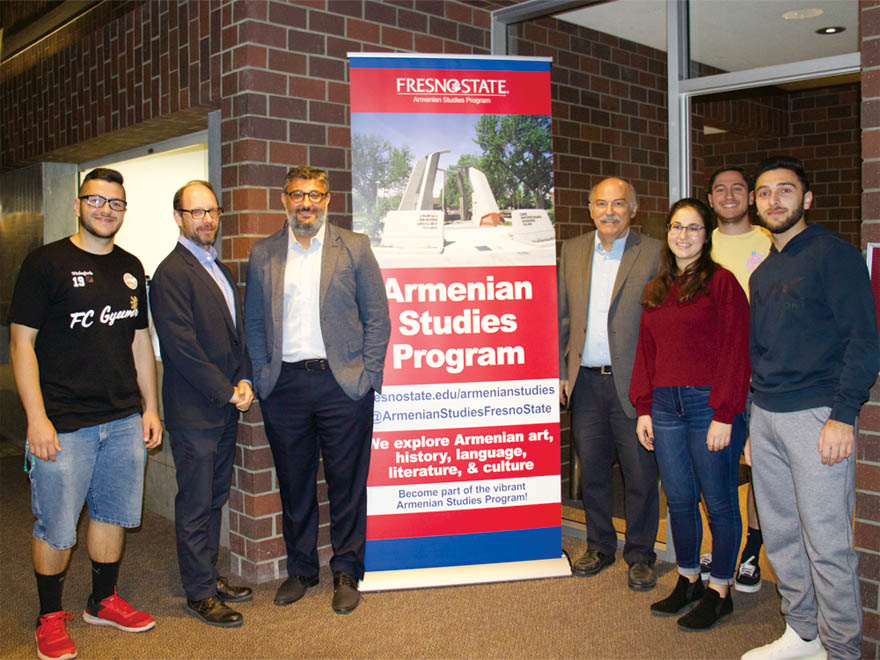
Photo: Andrew Hagopian
Yervand Boyajyan
Staff Writer
Over a hundred years has passed, and the Turkish government has yet to recognize the atrocious genocide of the Armenian people. It is a topic about which modern-day Turkey stays silent and continues to deny what the Ottoman Turkish Empire did to the Armenian people in 1915.
On Friday, November 8, 2019, Dr. Ümit Kurt gave an impressive presentation, “The Young Turks: Racism and the Construction of National Identity,” as part of the Armenian Studies Program Fall Lecture Series and co-sponsored by the Center for Ethics, Character, and Civic Education.
Dr. Kurt spoke about the rise of Turkish Nationalism and how growing nationalist ideas lead to the Genocide of the Armenian people. He explored Turkish Nationalism, its dangers, and its impact on minorities within the Ottoman Empire.
Dr. Kurt is a historian of the modern Middle East with a focus specifically on the Ottoman Empire. He has studied the Ottoman Empire extensively, in particular, the Empire’s nationalistic tendencies and the consequences of these tendencies. Dr. Kurt has also conducted numerous studies on Genocides of the 20th century, including the Armenian Genocide.
Much of Dr. Kurt’s research for this lecture was based on two publications, “The Balkan Wars and the Rise of the Reactionary Modernist Utopia in Young Turk Thought,” and the journal Turk Yurdu (Turkish Homeland). This latter publication explores the effects of the Balkan Wars on the Ottoman Empire and more specifically, the Committee of Union and Progress Party (CUP).
The lecture began with brief background and introductory information regarding Turkish Nationalism, especially in the years from 1911 to 1916, and how it led to the Armenian Genocide. Dr. Kurt outlined how the earliest effort of nationalism in the Ottoman Empire began with the attempt to simplify and cleanse the Turkish language of Arabic and Persian influences. Dr. Kurt then talked about the idea of a Turko-Aryan, which suggests that the Turks are a superior race and all other races in the Middle East and eastern Asia derive from a single Turkic race.
These concepts were for a purpose: for the unification of Ottoman subjects. Ottoman Nationalism really picked up pace after the devastating loss of the Balkan Regions to four Balkan countries in 1912-1913. In truth, the Ottoman leaders were embarrassed by their massive loss. In part, they blamed the defeat on minorities, including Armenians. The Ottoman Empire advocated nationalism to unite and promote Turkism throughout the empire so that its subjects did not feel ashamed of their leaders and their country.
Minorities within the Ottoman Empire, Greeks, Armenians, Kurds and others, did not fit into the Ottoman nationalist concept. As a result, these minority communities wanted to sever ties with the Ottoman Empire.
Turkish Nationalism began to take shape with the establishment of a nationalistic journal, Turk Yurdu. Yusuf Akçura was one of the founders of the journal and was one of the lead writers. Dr. Kurt added that the concept of Pan-Turkism was developed and popularized by Akçura himself. The goal of the journal was to elaborate on the roots of the Turkish people with one goal: the unification of Turkish subjects in the Ottoman Empire.
Dr. Kurt added that the founders of Turk Yurdu did not use religion to unite the Turkish people, but rather the idea of tribalism, based on the belief that all Turkish people came from one place and that they shared a common Turkish ancestor. By using tribe, as Dr. Kurt argued, the contributors to Turk Yurdu were able to claim that the Turkish people originated long before other people like the Armenians, Greeks, Assyrians, or Arabs.
Dr. Kurt’s lecture provided insight into the development of the CUP ideology, and how the racist views expressed by some Turkish intellectuals ultimately led to the Armenian Genocide.
 Hye Sharzhoom Armenian Action
Hye Sharzhoom Armenian Action